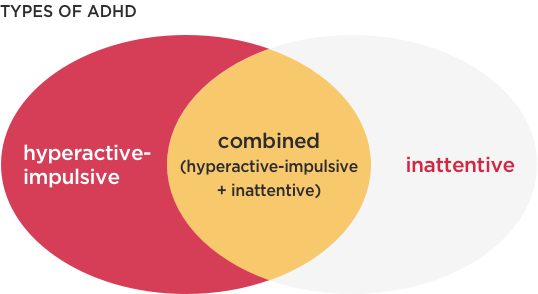What are common symptoms?
ADHD symptoms appear as an ongoing pattern of inattention and/or hyperactivity-impulsivity. It is important to note that while we may all feel the symptoms of ADHD from time to time (e.g., being easily distracted, forgetful, not paying attention), it doesn’t mean we have ADHD. People diagnosed with ADHD have more of these symptoms, they’ve had them since childhood, they occur more frequently, and these symptoms interfere with their daily life. ADHD can affect a person from morning to evening – beyond the classroom or workplace.
Hyperactive-impulsive
symptoms
- Fidgeting or squirming
- Has trouble remaining seated
- Has trouble waiting or taking turns
- Grabbing someone else’s belongings
- Talks nonstop
- Runs around or climbs a lot
(in children); extreme restlessness
(in adults)
Symptoms of
inattention
- Has a hard time paying attention
- Does not pay close attention to details
or makes careless mistakes - Does not appear to listen
- Has trouble with organization
- Struggles to follow through
with instructions - Loses things
- Is easily distracted
As people with ADHD grow older, their symptoms
may change or take on different forms.
The three types of ADHD
Some people have more symptoms of hyperactivity and impulsiveness, others have more symptoms of inattentiveness, and some have symptoms from both categories. Depending on the symptoms, ADHD is divided into the following three types.

If you think you, your child, or a loved one might have ADHD, talk to your doctor. To prepare for your appointment, it might be helpful to make a list of:
- Any symptoms you’ve noticed and problems they may have caused (e.g., trouble at work, school, or in relationships; trouble with the law; motor vehicle accidents;
etc.)- Note symptoms you’ve observed during the day and evening (e.g., difficulty with after-school activities or part-time jobs, struggling to get chores done, sleep issues)
- Any major changes in your/your loved one’s life (e.g., changing schools, losing or changing jobs, divorce, etc.)
- All medications you/your loved one are taking including vitamins, herbs or supplements
- Any questions you have for your doctor
It might also be helpful to gather report cards (for children) or performance reviews (for adults) to assist in the diagnostic evaluation.
ADHD & Sleep
One other aspect of ADHD is its potential impact on sleep. In fact, at least 1 in 2 people with ADHD report significant sleep problems. This can include difficulties falling asleep, staying asleep and early morning awakenings.
Keep in mind: Poor sleep is a possible outcome of ADHD itself
You or your child may struggle to fall asleep because of the symptoms of ADHD.
For example, you or your child may:
- Find it hard to keep a sleep schedule
- Resist going to bed
- Have difficulties “turning thoughts off”
- Not be able to lie still while trying to settle in for the night
- Struggle with consistent sleep hygiene
- Have trouble limiting screen time before bed
If your child is having difficulties with sleep, you may want to complete this sleep screening tool to help your doctor better understand their challenges and work on a solution.
The good news is that using sleep hygiene strategies can help you or your child manage sleep issues.
MYTHS VS FACTS
There are many myths associated with ADHD. It is important to separate fact from fiction so that we can better understand what people with ADHD are truly experiencing. The more we understand, the better we can help them.
